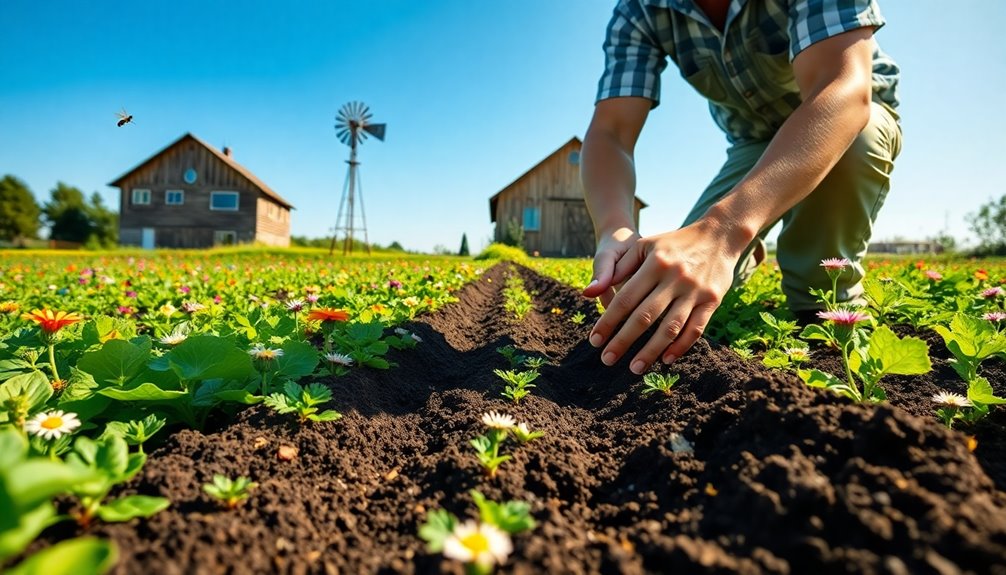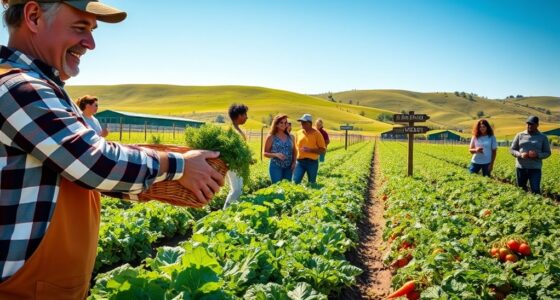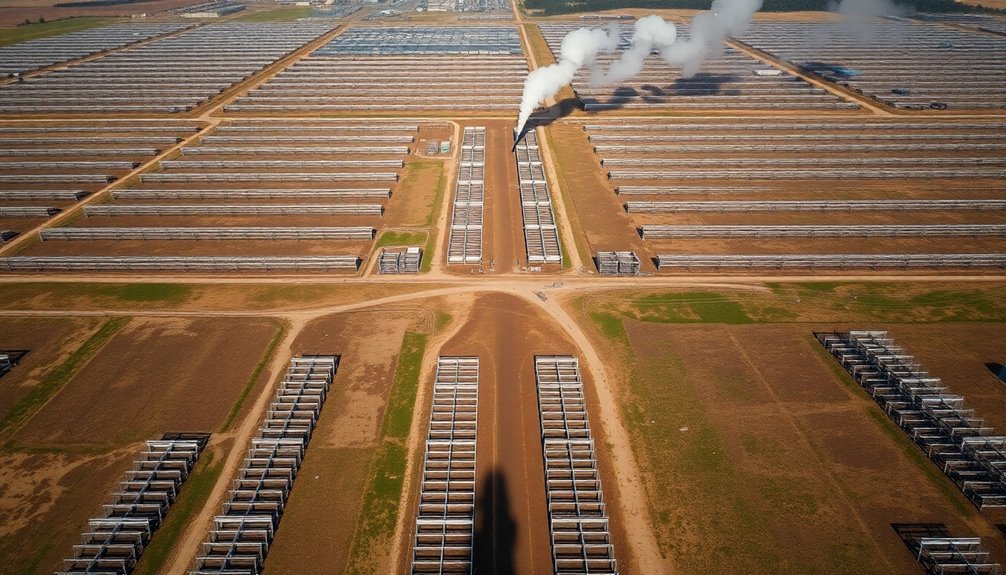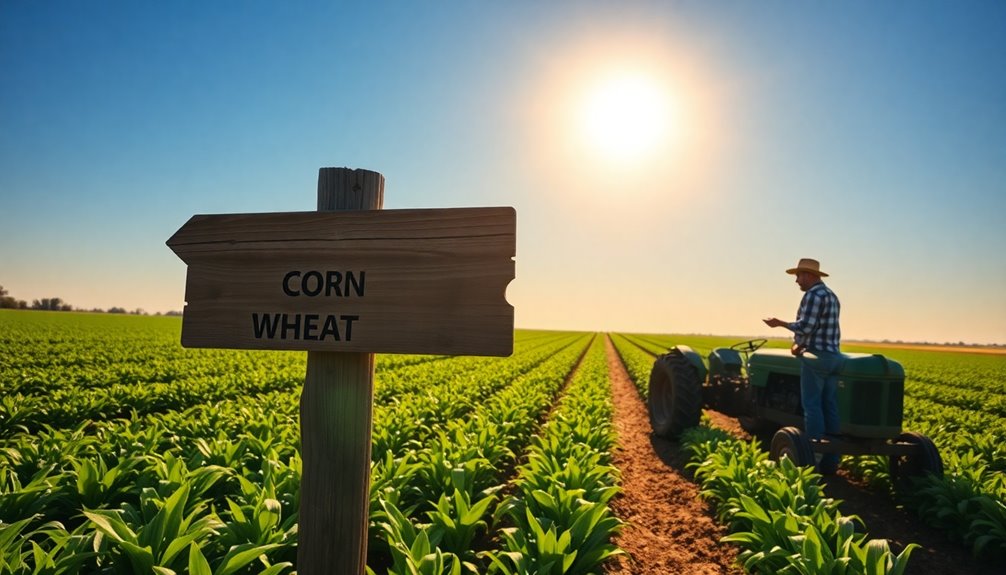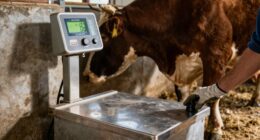Organic farming is a sustainable farming method that avoids synthetic fertilizers and pesticides, focusing instead on natural processes. You'll often see practices like crop rotation, composting, and cover cropping, all aimed at enhancing soil health and promoting biodiversity. This approach also emphasizes environmental sustainability, reducing chemical pollution and improving overall ecosystem health. While organic products can command premium prices, the certification process involves strict guidelines and regular inspections, which can be challenging for small farmers. If you want to grasp the nuances of organic farming and its implications for human geography, there's plenty more to explore.
Key Takeaways
- Organic farming emphasizes sustainable practices, avoiding synthetic fertilizers, pesticides, and GMOs to promote soil health and ecosystem balance.
- Crop rotation, composting, and cover cropping are integral techniques used in organic farming to enhance fertility and reduce chemical use.
- Organic certification requires strict adherence to guidelines, with annual inspections and documentation to maintain compliance and marketability.
- The organic market is growing, driven by consumer preference for healthier, environmentally sustainable food options, commanding premium prices.
- Environmental benefits include reduced chemical runoff, improved soil health, and enhanced biodiversity, contributing to long-term sustainability and climate change mitigation.
Definition of Organic Farming
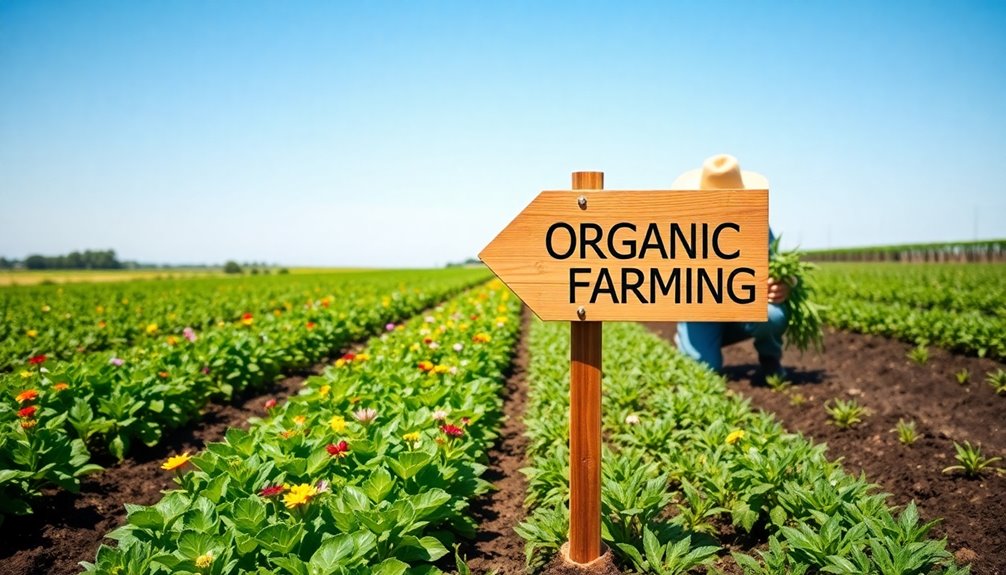
Understanding organic farming means recognizing it as a practice that shuns synthetic fertilizers, pesticides, and GMOs. Instead, you'll find a focus on sustainable and natural methods that prioritize soil health.
Organic farming emphasizes practices like crop rotation, composting, and cover cropping, enhancing biodiversity and ecosystem health. To achieve organic certification, farms must comply with strict guidelines and undergo regular inspections, ensuring they meet national and international standards.
While yields in organic farming are often lower than conventional methods, the potential for higher profits exists due to consumer demand for healthier options.
Key Principles and Practices
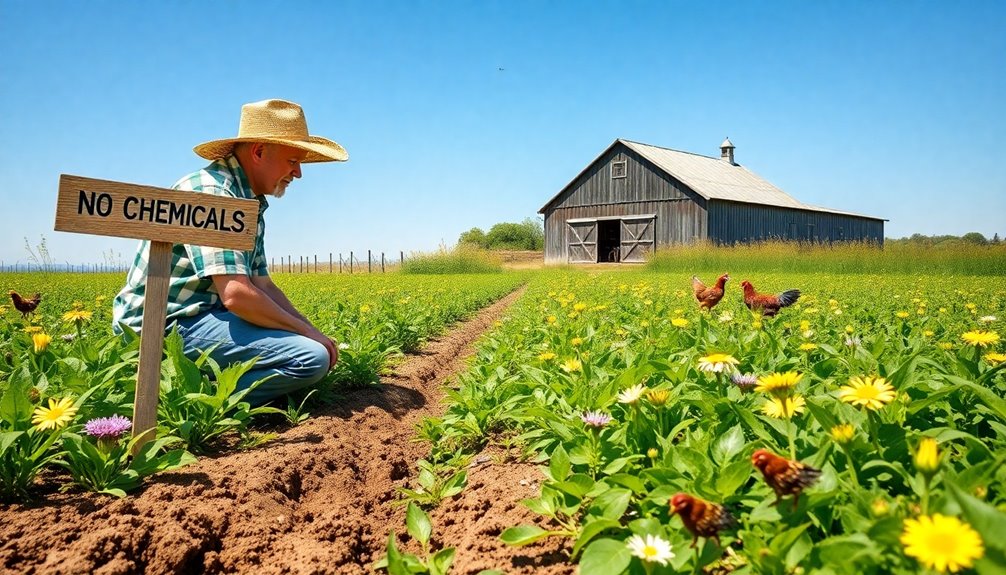
Organic farming revolves around several key principles and practices that distinguish it from conventional agriculture.
You'll find that organic practices prioritize environmental sustainability by steering clear of synthetic fertilizers, pesticides, and GMOs. Techniques like crop rotation, cover cropping, and composting enhance soil fertility while reducing dependency on chemicals.
Natural pest control methods emphasize biological solutions instead of synthetic pesticides, promoting a healthier ecosystem.
To guarantee compliance with organic standards, farmers must obtain certification, which involves adhering to strict guidelines, undergoing regular inspections, and maintaining thorough documentation.
While organic farms may yield less than conventional ones, they often achieve higher profitability through premium pricing, driven by an increasing consumer demand for organic products.
Must-Know Facts
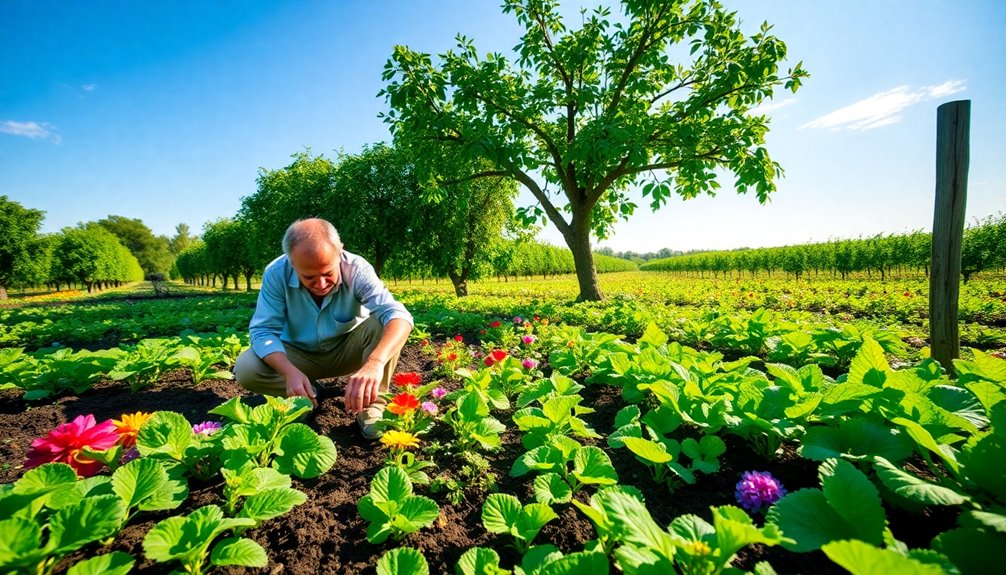
When exploring organic farming, it's important to grasp some must-know facts that highlight its significance in today's agricultural landscape. Here are some key points to reflect on:
- Organic farming avoids synthetic fertilizers and pesticides, focusing on natural processes.
- The demand for organic products is rising, driven by consumer preferences for healthier options.
- Techniques like crop rotation, cover cropping, and composting enhance soil health and minimize environmental impact.
- Although organic farms may yield less than conventional ones, they often achieve higher profits due to premium pricing.
- Certification involves strict guidelines and regular inspections to verify adherence to organic standards.
Understanding these facts will deepen your appreciation for organic farming's role in promoting sustainability and environmental well-being.
Environmental Benefits
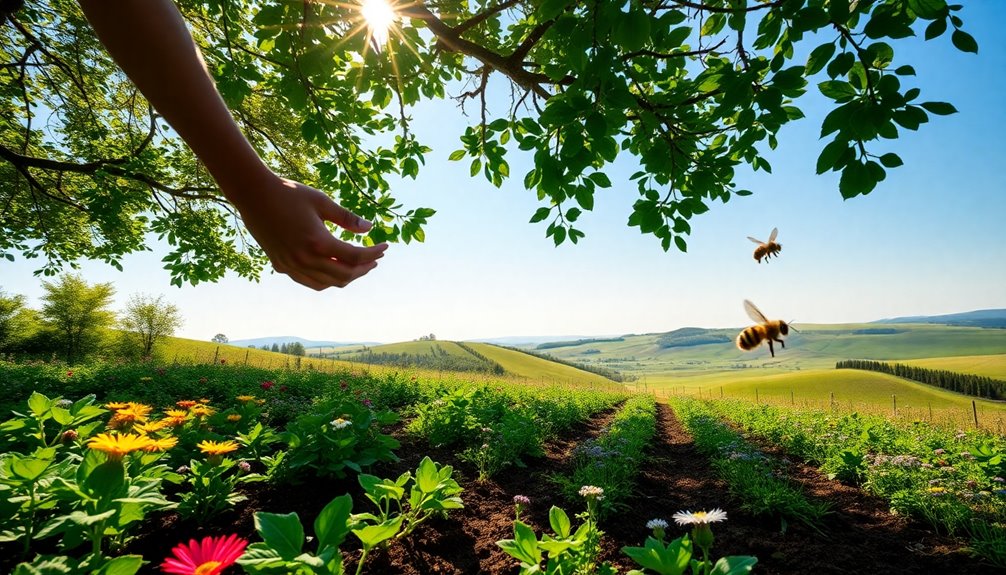
The environmental benefits of organic farming are profound and far-reaching. By using organic methods, you reduce reliance on synthetic chemicals, which decreases soil and water contamination, promoting healthier ecosystems.
Enhancing soil fertility through natural practices like composting and crop rotation contributes to long-term agricultural sustainability, addressing key environmental challenges. Organic farming also promotes biodiversity by maintaining a variety of plant and animal life, bolstering ecosystem resilience against pests and diseases.
Additionally, these techniques help mitigate climate change impacts by sequestering carbon in the soil and potentially lowering greenhouse gas emissions. Overall, organic farms typically have a smaller carbon footprint than conventional farms, thanks to their focus on sustainable practices and local food systems, which reduce transportation emissions. Furthermore, integrating renewable energy solutions into organic farming can enhance sustainability and reduce reliance on fossil fuels.
Economic and Policy Implications
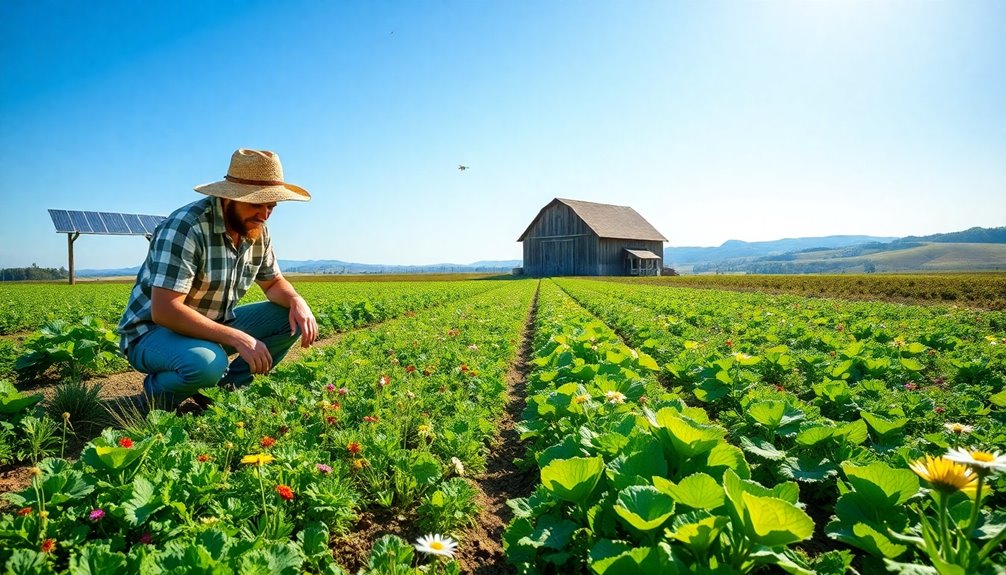
Maneuvering the economic landscape of organic farming reveals both challenges and opportunities for farmers. As you consider the shift to organic practices, keep in mind the following economic and policy implications:
- Initial costs for certification can be high, limiting small producers.
- Organic products typically command premium prices, enhancing profitability.
- Consumer demand for healthier options drives market trends.
- Supportive government policies, like subsidies, promote organic farming.
- Conventional agriculture policies may hinder organic growth.
Navigating these factors is essential for success.
While higher initial costs and lower yields may pose challenges, the potential for increased profitability and consumer support can make organic farming a viable and rewarding option for many.
Review Questions
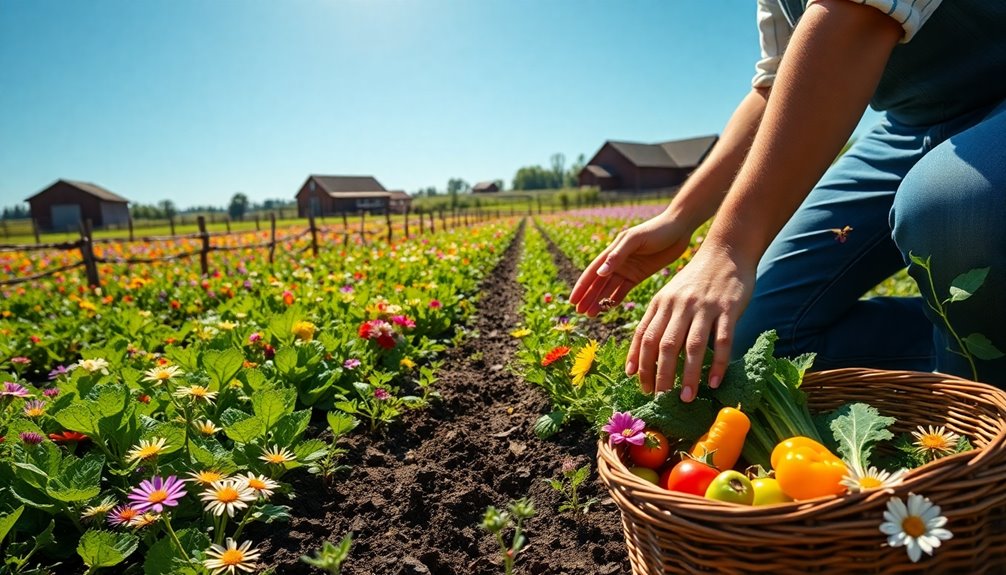
Now that you understand the basics of organic farming, let's consider how it addresses environmental challenges.
Think about the economic implications of choosing organic methods over conventional ones.
What key factors come to mind when you reflect on these points?
Environmental Challenges Addressed
Organic farming plays an essential role in addressing various environmental challenges by eliminating synthetic pesticides and fertilizers.
By adopting organic practices, you contribute to a healthier ecosystem and mitigate several pressing issues:
- Reduces chemical runoff, protecting water sources from contamination.
- Enhances biodiversity, promoting a resilient ecosystem to fight pests and diseases naturally.
- Improves soil health through techniques like crop rotation and composting, which sequester carbon and combat climate change.
- Minimizes soil degradation, preserving its fertility and structure.
- Follows strict guidelines for sustainability, ensuring practices align with environmental and biodiversity goals.
Economic Implications Explained
The benefits of organic farming extend beyond environmental sustainability; they also encompass significant economic implications for farmers and the agricultural market as a whole.
While you might face higher initial costs due to certifications and natural methods, the potential for premium pricing on organic products can lead to greater profitability. Consumers increasingly perceive organic products as healthier, driving up demand and influencing economic trends within the agricultural sector.
Additionally, supportive government policies, like subsidies and funding for education on sustainable practices, help bolster organic farming's growth.
However, conventional farming policies may create barriers, restricting access to resources and markets for organic producers. Understanding these dynamics is vital for grasping the economic landscape of modern agriculture.
Related Terms
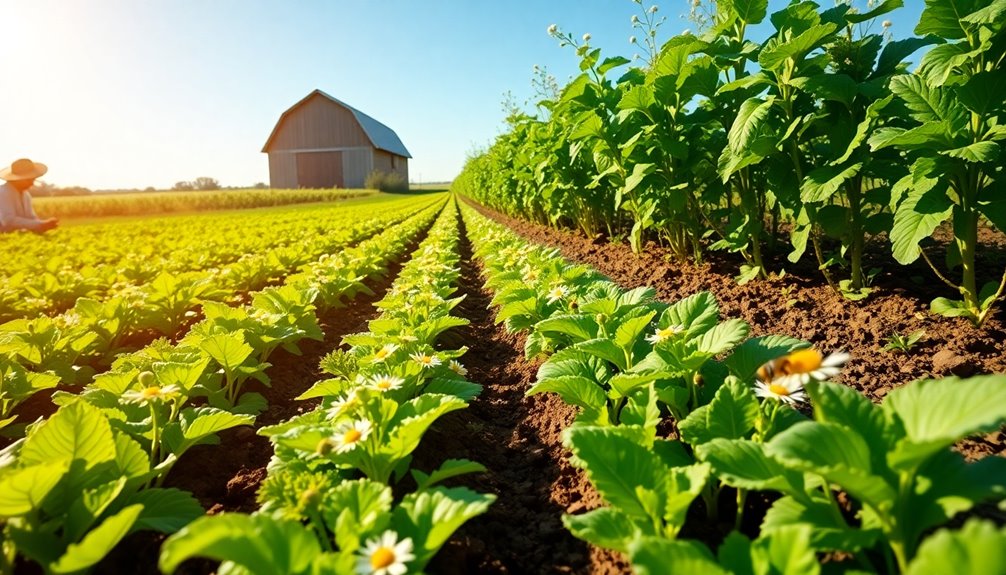
When exploring organic farming, it's crucial to understand related terms like sustainable agriculture practices and their benefits for biodiversity and ecosystems.
You'll also want to familiarize yourself with the certification and regulations that guarantee these practices are upheld.
This knowledge can help you appreciate the broader context of organic farming and its impact.
Sustainable Agriculture Practices
How can sustainable agriculture practices transform our approach to farming? By prioritizing environmental health, you can reduce reliance on synthetic fertilizers and pesticides, opting for natural alternatives that promote soil and ecosystem liveliness.
Here are some key practices to contemplate:
- Crop rotation to maintain soil fertility
- Cover cropping to prevent erosion
- Composting for nutrient-rich soil
- Natural pest control methods to minimize chemical use
- Supporting local food systems to decrease carbon footprints
These methods not only help maintain soil quality but also contribute to climate change mitigation by sequestering carbon.
Embracing sustainable agriculture fosters community resilience and creates a more balanced relationship between farming and the environment, ultimately leading to healthier ecosystems.
Biodiversity and Ecosystem Benefits
Organic farming plays a significant role in enhancing biodiversity and providing ecosystem benefits. By promoting diverse crops and natural habitats, organic farms support a wider range of species within agricultural ecosystems.
Since they avoid synthetic pesticides and fertilizers, these farms reduce chemical runoff into waterways, protecting aquatic ecosystems and fostering healthier soil microbial communities.
Additionally, organic farms often utilize natural pest control methods, like introducing beneficial insects, which improves resilience against pests without harming non-target species.
Practices such as crop rotation and cover cropping enhance soil health, increase organic matter, and improve water retention.
Furthermore, organic farming can sequester carbon in the soil, mitigating climate change impacts and promoting healthier ecosystems through improved soil structure and fertility.
Certification and Regulations Overview
Maneuvering the world of organic farming requires understanding the certification and regulations that govern it.
To achieve organic certification, you must adhere to strict guidelines that vary by country. This process guarantees farms maintain organic practices, avoiding synthetic chemicals and GMOs.
Here's what you need to know:
- Certification involves regular inspections and documentation.
- The USDA National Organic Program (NOP) sets specific organic labeling guidelines.
- Compliance can be costly, posing barriers for small farmers.
- Maintaining organic status requires annual audits.
- Organic certification can enhance marketability and allow access to premium pricing.
Consumer Trends
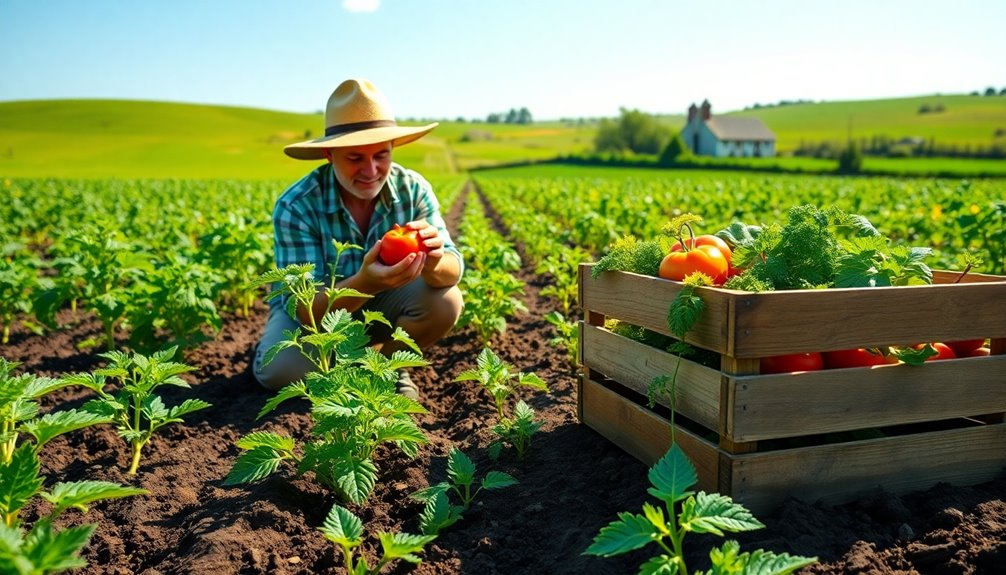
Consumer trends in the organic farming sector have shifted dramatically over recent years, reflecting a heightened awareness of health and environmental issues.
You've likely noticed that consumer demand for organic products has soared, with sales surpassing $61 billion in the U.S. in 2020. About 75% of U.S. households now purchase organic food at least occasionally, signaling a clear preference for healthier and environmentally sustainable options.
While organic products often carry a price premium of 10% to 50% due to higher production costs, this hasn't deterred consumers. Social media and digital marketing are shaping these trends, especially among younger generations who actively seek organic choices.
As a result, the global organic food market is projected to grow at a robust CAGR of 10.5% through 2028.
Exam Preparation Tips
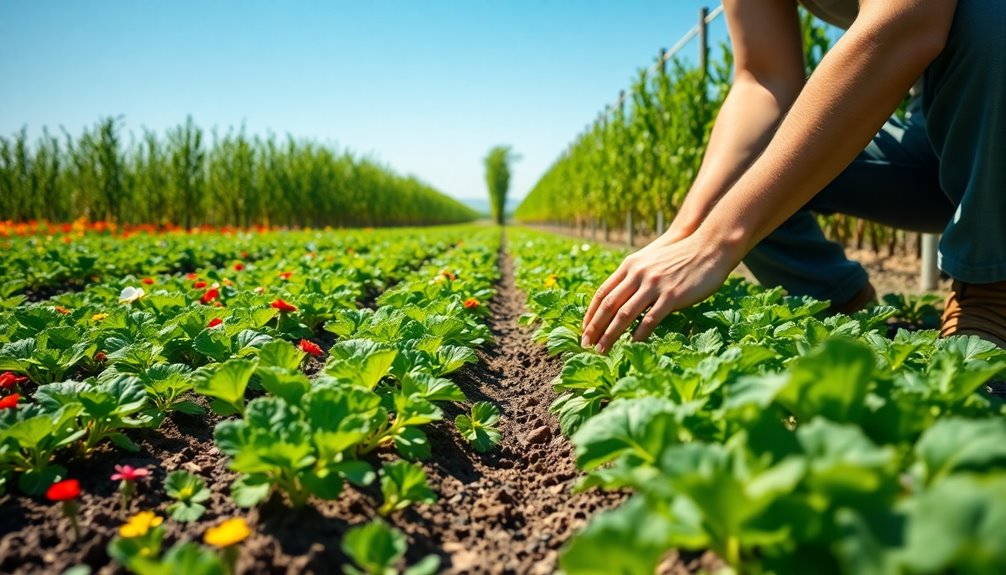
As you prepare for exams on organic farming, it's important to grasp key concepts and details that will help you excel. Here are some tips to guide your study sessions:
- Familiarize yourself with the definition of organic farming and its focus on sustainability.
- Learn five must-know facts, including crop rotation and certification guidelines.
- Review the economic implications, noting how premium pricing can boost profitability.
- Understand the environmental benefits, such as improved soil health and reduced water pollution.
- Practice answering questions that compare organic and conventional farming, consumer demand, and government policies.
Frequently Asked Questions
What Is Organic Farming in AP Human Geography?
Organic farming focuses on sustainable agricultural practices that avoid synthetic chemicals and GMOs.
You'll find it emphasizes techniques like crop rotation and composting to enhance soil health.
While yields might be lower than conventional methods, the appeal of organic products often leads to higher prices.
You can see its impact on environmental sustainability, as organic farming helps reduce pollution and promotes biodiversity.
Understanding this can deepen your awareness of agricultural trends in human geography.
What Is the Definition of Organic Farming in Geography?
Organic farming in geography refers to an agricultural practice that focuses on growing food without synthetic chemicals or genetically modified organisms.
You'll find that it emphasizes sustainability and environmental health, often using methods like crop rotation and composting. This approach aims to maintain soil fertility and promote biodiversity.
While organic yields might be lower than conventional farming, the premium prices for organic products can make it a profitable choice for farmers.
What Is the Definition of Farming AP Human Geography?
Farming's like the heartbeat of human civilization, pulsing life through the soil.
In AP Human Geography, farming refers to the cultivation of crops and raising animals for food and other products. You'll explore various types, like subsistence agriculture, where locals grow just enough to eat, and commercial agriculture, which aims for profit.
Understanding these distinctions helps you grasp how agricultural practices shape economies and communities worldwide, revealing the intricate web of human-environment interaction.
What Is the Knowledge of Organic Farming?
You should know that organic farming emphasizes natural methods over synthetic ones.
It uses techniques like crop rotation and composting to maintain soil health and promote biodiversity. While organic farms might yield less than conventional ones, they often bring in higher profits because consumers are willing to pay more for healthier food.
Plus, organic practices help reduce water pollution and support environmental sustainability, making it an essential aspect of modern agriculture.
Conclusion
In the grand tapestry of agriculture, organic farming stands as a beacon of hope for a healthier planet. By embracing its key principles, you're not just nurturing crops; you're cultivating a sustainable future. The environmental benefits are undeniable, and the economic implications can pave the way for innovative policies. So, as you prepare for your AP Human Geography exam, remember that understanding organic farming isn't just an academic exercise—it's a step toward a greener tomorrow.

